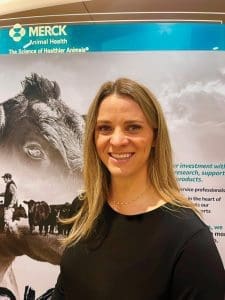
By Larry Stalcup Contributing Editor
Fastidious food producers, retailers and consumers are becoming more demanding in knowing how and where their beef is produced. Using a new DNA-based sampling process, Merck Animal Health is helping cattle producers satisfy those picky beef buyers.
Merck’s DNA TRACEBACK platform goes beyond the use of electronic identification (EID) tags, which provide AI technology to help producers and feeders manage cattle performance and special production programs or identify diseased cattle. Allison Flinn, DVM, executive director, Value Chain and Consumer Affairs, Merck Animal Health, says the new traceback program “uses nature’s barcode – DNA” to provide beef supply chain links with data that is “100 percent unique for individual animals.
“DNA TRACEBACK allows [beef]) supply chains to ensure that production claims consumers might be interested in [such as] animal welfare, sustainability or even farm origin can be traced.”
In an interview with CALF News during this year’s Cattle Industry Convention & NCBA Trade Show in New Orleans, Flinn says the traceback program could identify the “differentiation in that product and build consumer confidence and trust in food labels.”
Traceback is based off taking DNA samples and linking them back to an animal EID. Beef and other protein products can be traced back into the food retail supply chain.
“We trace it so you can trust it,” she explained, noting that TRACEBACK provides “an evidence-based solution. Each animal in the program is DNA sampled so that, in every stage of the production chain – from the farm gate, the processing plant and right through to the restaurant plate – the exact origin of meat is verified.”
In the program, a DNA sample is captured at harvest and assigned a unique barcode number. This DNA number is then linked to the animal and can be traced through the supply chain all the way to individual cuts of meat served in restaurants.
The DNA number provides an advanced method of helping meet consumer demand for quality, humanely and environmentally friendly produced beef, Flinn says. Traceback customers, including Braveheart Beef, Open Prairie Natural Meats and other clients, serve retailers and consumers who seek pasture-to-plate information on meat products they buy.
“Our customers are looking to showcase their products,” she says. “The program is great for large [meat production and marketing] programs, as well as local or regional programs. Consumers are putting a premium on transparency – especially for beef. Traceback provides a customizable solution.”
Consumer Preference Survey
To learn more about consumer preferences, Merck Animal Health conducted a consumer transparency survey of more than 1,000 consumers who represent the U.S. shopper. The study defined transparency as knowing how food was grown, raised and made. Traceability was defined as being able to follow the movement of food products and ingredients through the supply chain.
Results of the survey showed:
• Two-thirds or 66 percent of consumers reported transparency in animal proteins as extremely or very important, with health and nutrition as their main reasons for seeking transparency.
• 86 percent of consumers who reported transparency as important also rank traceability as extremely or very important and 40 percent of those consumers also want to know the origin of livestock.
• Over 50 percent reported they were willing to pay a 5 percent premium for transparency on the label and want more information on how their food is grown and raised to make informed decisions at the grocery store.
• High-transparency seekers are typically millennial, non-Caucasian, educated males who live in urban areas with their children – and they do the grocery shopping.
• About 55 percent surveyed considered environmental sustainability as very or extremely important and 66 percent reporting animal care/treatment as extremely important/very important.
“The survey results tell us consumers want more information than ever in order to make informed decisions about the food they put on their dinner tables,” Flinn says. “We want to ensure it is easy for farmers and ranches to connect the dots [on reaching these consumers].
“This DNA TRACEBACK evidence-based solution and EID can provide objective data, build trust and build more demand.”





